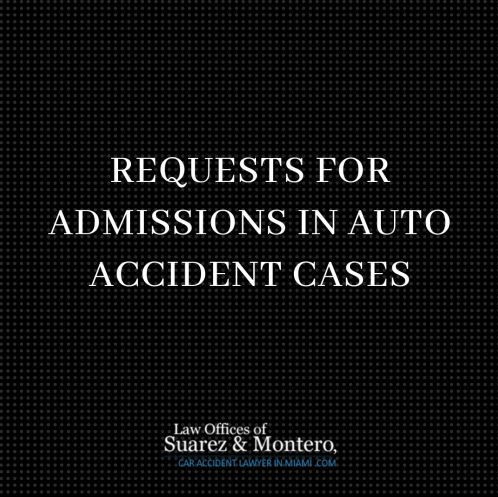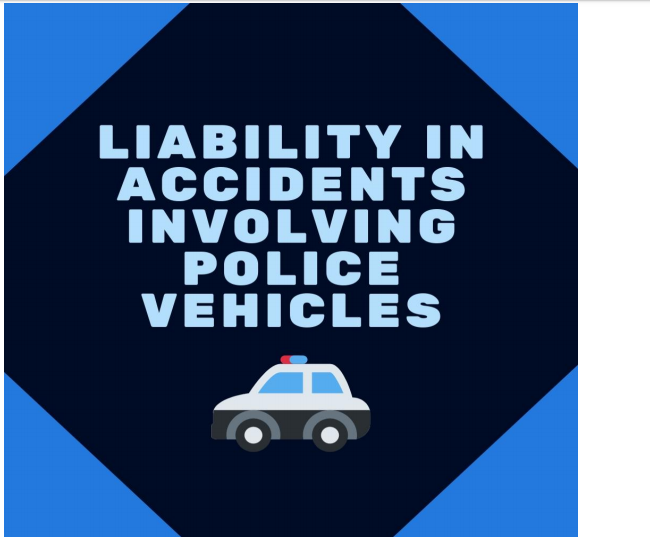
Requests for Admissions in Auto Accident Cases
After filing a lawsuit, the next step is beginning the discovery process. Discovery is the formal term for saying that the parties will exchange information and documents about the case. Generally, requests for admissions (“RFAs”) are used to save time, effort and resources on sub- issues of a legal case. Requests for admissions serve an important role in narrowing the issues to be resolved at trial. The requirements that pertain to requests for admissions are set out in Rule 1.370 of the Florida Rules of Civil Procedure. In summary, a party may request that another party admit the truth of a statement of opinion or fact or the genuineness of a document. The party to whom the request is directed must then answer by admitting or denying the truth of the matter or by making an objection to the request. Failure to respond to the request within the time allowed by the rule is an admission. When a matter is admitted either by an answer or failure to answer within the allotted time, the effect of the admission is to conclusively establish the truth of the matter that is the subject of the request. A party may serve requests for admissions only on another party. As with interrogatories, the procedure does not apply to nonparty witnesses.
Types of Requests for Admissions
It is proper to seek an admission of a statement of opinion as well as a statement of fact, or a mixed question of fact and opinion. A request may address a matter that would be dispositive of an entire claim or defense. A request may also be served to obtain admissions regarding the genuineness of documents. The party serving the request must provide copies of the documents along with the request unless they have already been provided or unless they were previously available to the responding party for inspection and copying. However, the limitations on the right to conduct discovery apply to requests for admissions as they apply to other forms of discovery. A request for admission must be within the general scope of discovery which means the proposition to be admitted or denied must be relevant to the subject matter of the action. Furthermore, the matter to be admitted must not be privileged.
Propounding Requests for Admissions
The Florida Rules of Civil Procedure provides that the defendant may serve requests for admissions on the plaintiff at any time after commencement of the action. The plaintiff may also serve written requests for admissions on the defendant at any time after the defendant has been served with process and the initial pleading. A party may ask any other party to admit the truth of any matter stated in the written request within the scope of discovery, including statements or opinions of fact or the application of law to fact, or that documents described in the request are genuine. No more than 30 requests, including subparts, can be made without court permission or stipulation. Each request should be limited to one matter. The Florida Rules of Civil Procedure limits the number of questions a party may ask in a request for admissions unless the court permits a greater number after a showing of good cause. This limit differs from the one placed on the number of interrogatories that may be propounded in that it enables the parties to agree to ask more questions than the rule allows. If matters are combined, it may be possible for the responding party to deny the request. Requests for admissions must be in writing and they must be served on the party who is to answer. Each matter that is the subject of a request for admission must be set forth separately in the requests. The usual method of meeting this requirement is to make separate requests in separately numbered paragraphs.
Responding to Requests for Admissions
The proposition that is the subject of each separate request must be admitted or denied with any qualification that is necessary to provide a complete answer. The Florida Rules of Civil Procedure provide that the answers must specifically deny the matter or set forth in detail the reasons why the answering party cannot admit or deny the matter. Thus, it is improper to submit a general denial. The denial must be specific, and it must directly address the proposition that is the subject of the request. In light of this provision, it would be improper to make a specific denial of a request for admission merely because the matter in question is technically untrue. Generally, the duty to answer is not excused by lack of knowledge. Rule 1.370(a) states that “[a]n answering party may not give lack of information or knowledge as a reason for failure to admit or deny unless that party states that that party has made reasonable inquiry and that the information known or readily obtainable by that party is insufficient to enable that party to admit or deny.
A Request for Production is simply a request for documents in the possession, custody, or control of a party. Most of the time, the documents that a Defendant will request will include medical records, medical bills, health insurance payment information, copies of tax returns (if you are claiming lost wages), and copies of past medical treatment records. Suarez & Montero Car Accident Lawyers is a South Florida personal injury law firm. Our attorneys have years of experience in guiding our clients through the Discovery process. Our attorneys meet with each of our clients in person to make sure that they have a full understanding of the questions being asked of them. Let us review your case and discuss your legal options. Our attorneys are ready to provide proven legal representation and stand ready to protect your rights. We are available 24/7 to give you a free, no risk case consultation!
We serve clients throughout Florida including those in the following areas:
Miami-Dade: Aventura, Coral Gables, Doral, Fontainebleau, Hialeah, Homestead, Kendall, Miami, Miami Beach, Miami Lakes, North Miami, Tamiami, and Westchester.
Broward: Fort Lauderdale, Hallandale Beach, Hollywood, Pembroke Pines, and Weston; and Palm Beach County including Boca Raton, Lake Worth, and West Palm Beach.





